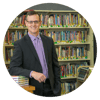Books have a way of shaping who we are. As a former second grade teacher, I know first-hand what impact reading can have on a young mind. There are, of course, the essential literacy skills built through reading from exposure to books from the earliest years of a child's life and through elementary school. But of equal value to literacy skills are the ideas presented in children's books, lessons about life, that influence a child and help to shape who they are.
This is also true of adults. We, too, are shaped by what we read. I suppose that any person who has read even a small amount over their lives could point to a title or two that changed how they think, inspired them to act on something, or gave them insight into a topic or problem with which they had been wrestling. That is certainly true for me, both personally and professionally.
There are five books in particular that I come back to time and time again, that have shaped me as an educator (and parent), challenging and influencing my thoughts on Christian worldview and the place of education in the formation of a person's life. I believe these books hold tremendous value for any parent navigating the best way to raise and educate their child.
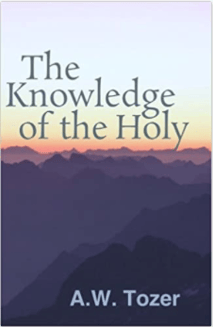 By far the most influential book in my life is A.W. Tozer’s The Knowledge of the Holy. I can’t begin to recount how many times over my 27 years in education that I have repeated to students the very first line of the book: “What comes into our minds when we think about God is the most important thing about us.” Tozer goes on to portray a towering view of God by taking various of His attributes and digging deeper into them so that the reader can gain a better understanding of who God is. Although it is highly readable, there are depths to this book that few others have. It is the first book I recommend to just about anyone.
By far the most influential book in my life is A.W. Tozer’s The Knowledge of the Holy. I can’t begin to recount how many times over my 27 years in education that I have repeated to students the very first line of the book: “What comes into our minds when we think about God is the most important thing about us.” Tozer goes on to portray a towering view of God by taking various of His attributes and digging deeper into them so that the reader can gain a better understanding of who God is. Although it is highly readable, there are depths to this book that few others have. It is the first book I recommend to just about anyone.
Questions for parents to consider:
- What comes into my mind when I think about God and how does that affect my parenting?
- In the ways that I communicate and teach my kids about God, what comes into their minds when they think about Him?
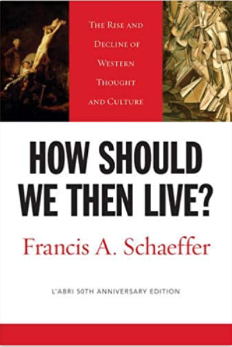 Reading Francis Schaeffer’s How Should We Then Live? allowed me to see how the flow of ideas and events throughout history influenced how we arrived at our contemporary world. Perhaps more importantly, it gave a deeper understanding as to how a Christian ought to live and make his way through that world. As he writes, “There is a flow to history and culture. This flow is rooted and has its wellspring in the thoughts of people. People are unique in the inner life of the mind – what they are in their thought-world determines how they act. This is true of their value systems and it is true of their creativity. It is true of their corporate actions, such as their political lives. The results of their thought-world flow through their fingers and tongues into the external world.” If you have not read Schaeffer, this is a good starting point as it is still relevant today.
Reading Francis Schaeffer’s How Should We Then Live? allowed me to see how the flow of ideas and events throughout history influenced how we arrived at our contemporary world. Perhaps more importantly, it gave a deeper understanding as to how a Christian ought to live and make his way through that world. As he writes, “There is a flow to history and culture. This flow is rooted and has its wellspring in the thoughts of people. People are unique in the inner life of the mind – what they are in their thought-world determines how they act. This is true of their value systems and it is true of their creativity. It is true of their corporate actions, such as their political lives. The results of their thought-world flow through their fingers and tongues into the external world.” If you have not read Schaeffer, this is a good starting point as it is still relevant today.
Questions for parents to consider:
- Through what lens do I view history and interpret current-day events?
- What do my actions say about my thought-world, and how is my thought-world acted upon in my life?
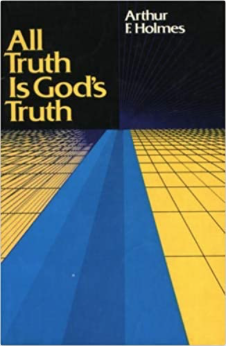 Arthur F. Holmes wrote All Truth is God’s Truth in 1977. In it, he carefully makes the argument that all truth, in every field of inquiry and every academic discipline, comes ultimately from God and finds its unifying focus in him. This is why Christian schools can play such a vital role in students’ discipleship. Study of the truth of God’s general revelation teaches us important things about His nature and work in our world. There is no such thing as “secular truth” because all truth is ultimately of divine origin. “The Christian has a mandate to emphasize truth in society, and to implement in the world that unity of truth which makes men free to live meaningfully.”
Arthur F. Holmes wrote All Truth is God’s Truth in 1977. In it, he carefully makes the argument that all truth, in every field of inquiry and every academic discipline, comes ultimately from God and finds its unifying focus in him. This is why Christian schools can play such a vital role in students’ discipleship. Study of the truth of God’s general revelation teaches us important things about His nature and work in our world. There is no such thing as “secular truth” because all truth is ultimately of divine origin. “The Christian has a mandate to emphasize truth in society, and to implement in the world that unity of truth which makes men free to live meaningfully.”
Questions for parents to consider:
- How am I communicating that "all truth is God's truth" to my children?
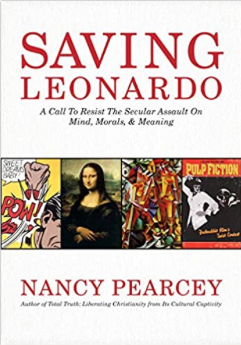 When Nancy Pearcy was younger, she spent time studying under Francis Schaeffer at L’Abri Fellowship in Switzerland. Since then, she has become perhaps the greatest Christian cultural apologist of our day. Her 2010 book, Saving Leonardo, is one of her best. Her subtitle is a “A Call to Resist the Secular Assault on Mind, Morals, and Meaning.” She takes a fresh approach to many of the great cultural questions of the day, in particular art, beauty, matters of life, entertainment, tyranny, and how 19th and 20th century academics and elites came to influence popular culture and life. It is truly fascinating. “The answer is that the ultimate goal is to preach the gospel. But the gospel is not so simple to those whose background prevents them from understanding it. Today’s global secular culture has erected a maze of mental barriers against even considering the biblical message. The goal of worldview analysis is to knock down those barriers, ‘to demolish strongholds’ – as the apostle Paul puts it.
When Nancy Pearcy was younger, she spent time studying under Francis Schaeffer at L’Abri Fellowship in Switzerland. Since then, she has become perhaps the greatest Christian cultural apologist of our day. Her 2010 book, Saving Leonardo, is one of her best. Her subtitle is a “A Call to Resist the Secular Assault on Mind, Morals, and Meaning.” She takes a fresh approach to many of the great cultural questions of the day, in particular art, beauty, matters of life, entertainment, tyranny, and how 19th and 20th century academics and elites came to influence popular culture and life. It is truly fascinating. “The answer is that the ultimate goal is to preach the gospel. But the gospel is not so simple to those whose background prevents them from understanding it. Today’s global secular culture has erected a maze of mental barriers against even considering the biblical message. The goal of worldview analysis is to knock down those barriers, ‘to demolish strongholds’ – as the apostle Paul puts it.
Questions for parents to consider:
-
What are my views on secular culture?
-
What place do I think history Christianity has in academics and the arts?
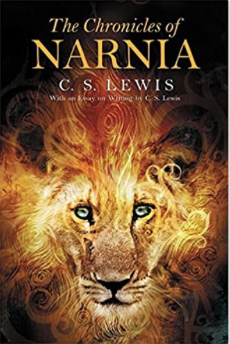 Finally, my favorite book(s) of all time: C.S. Lewis’ The Chronicles of Narnia. I first read these “children’s books” as an adult. I was stunned by the depth wrapped up in a beautiful tale that could be understood by anyone. I think this is the perfect example of how stories can form categories in our minds that allow us to understand the ultimate story of the gospel more fully. It’s a masterpiece and if you only know the story through the films, do yourself a favor and set aside some time to read through books themselves. It is where I first encountered the notion that Aslan is not a tame lion. As Mrs. Beaver told the Pevensie children, “Safe? Who said anything about safe? ‘Course he isn’t safe. But he’s good. He’s the King, I tell you!”
Finally, my favorite book(s) of all time: C.S. Lewis’ The Chronicles of Narnia. I first read these “children’s books” as an adult. I was stunned by the depth wrapped up in a beautiful tale that could be understood by anyone. I think this is the perfect example of how stories can form categories in our minds that allow us to understand the ultimate story of the gospel more fully. It’s a masterpiece and if you only know the story through the films, do yourself a favor and set aside some time to read through books themselves. It is where I first encountered the notion that Aslan is not a tame lion. As Mrs. Beaver told the Pevensie children, “Safe? Who said anything about safe? ‘Course he isn’t safe. But he’s good. He’s the King, I tell you!”
Questions for parents to consider:
- What books can I read with my children that will help them to form categories in their minds for what is true?
/Logos/Horizontal%20Academic%20Logo%20for%20Light%20Backgrounds.png)
/Logos/Horizontal%20Academic%20Logo%20for%20Dark%20Backgrounds.png)

